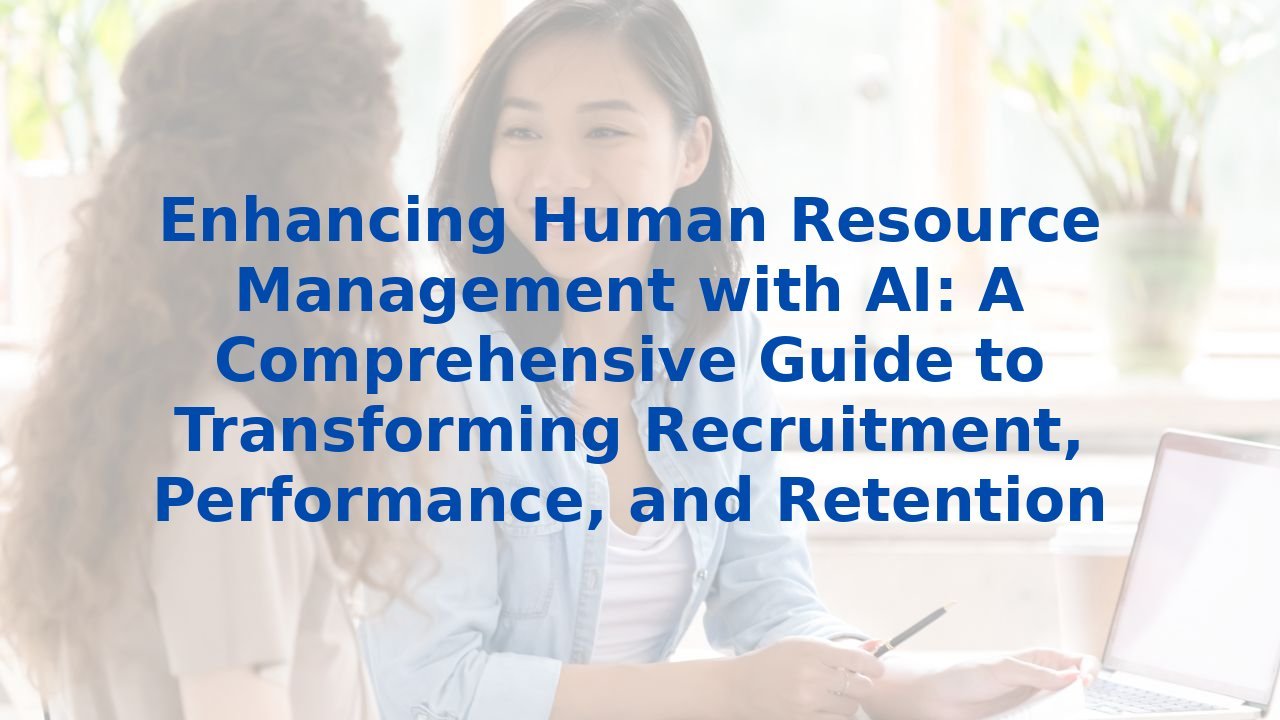Enhancing Human Resource Management with AI: A Comprehensive Guide to Transforming Recruitment, Performance, and Retention
Enhancing Human Resource Management with AI: A Comprehensive Guide
Introduction
In an era marked by rapid technological advancement, the role of human resource management (HRM) is undergoing a transformative shift. As organizations evolve, integrating artificial intelligence (AI) into HR processes is not just an option—it’s a necessity. This blog post explores how AI is revolutionizing recruitment, performance management, employee retention, and staff appreciation, ultimately enriching the overall business ecosystem.
1. Streamlining Recruitment with AI
Recruitment, the heartbeat of human resource management, stands to benefit immensely from AI. Traditional approaches often involve labor-intensive manual resume screenings that consume valuable time and can perpetuate bias. By employing AI-driven solutions, organizations can automate resume analysis and match candidates to job descriptions accurately.
This innovation not only accelerates the hiring process but also enhances the quality of candidate selection. AI systems can scour online platforms to identify passive candidates—those who might not actively seek new positions but could be an excellent fit if approached. With tools for automated video interviews and personality assessments, the cumbersome multi-round interview process can be streamlined significantly. The result? A faster, more efficient hiring process built on data-driven insights.
2. Enhancing Performance Management
When it comes to performance management, AI introduces a paradigm shift from subjective evaluations to objective assessments. Traditional performance reviews often rely on human judgment, which can be inherently biased. However, AI-powered systems consistently track employee performance metrics, offering an unbiased repository of insights regarding achievements and growth areas.
These systems analyze various parameters—from completed tasks to peer feedback—enabling managers to provide constructive, data-backed feedback. Such approaches not only uncover opportunities for employee advancement but also make the recognition of potential leaders more systematic and unbiased. In a world where performance drives success, this data-driven evaluation serves as a powerful tool for organizational growth.
3. Improving Staff Retention
Retaining talent presents a considerable challenge in today’s competitive landscape. AI contributes to this critical area by revealing insights into employee engagement and satisfaction levels. With automated feedback mechanisms, organizations can gather real-time data on employee sentiments, leading to actionable strategies that improve workplace morale.
Moreover, understanding work patterns and employee well-being plays a pivotal role in retention strategies. By analyzing workload metrics, AI can assist HR teams in mitigating burnout risks and fostering a supportive work environment. Thus, not only do we enhance employee satisfaction, but we also cultivate a culture of loyalty and dedication.
4. Fostering Staff Appreciation and Mentorship
A thriving workplace culture rests on the pillars of recognition and mentorship. Here again, AI steps in to facilitate personalized training programs tailored to individual employee needs. By assessing how each employee learns best, organizations can foster personal and professional growth paths that truly resonate with their workforce.
Additionally, AI can match employees with mentors who align with their career aspirations and skill sets, enhancing the mentorship experience. This tailored approach not only boosts employee engagement but also contributes to a sense of belonging, leading to increased job satisfaction and reduced turnover rates.
Benefits of Training Employees for AI
While the technology behind AI continues to advance, it’s essential to equip employees with the skills to navigate this new landscape effectively. Training programs focusing on data analysis, machine learning principles, and natural language processing can significantly enhance HR operations.
By investing in such training, organizations prepare their teams for a future where AI plays a central role in daily activities. A well-trained workforce can harness AI tools more effectively, making the transition smoother and creating an environment ripe for innovation. This not only benefits organizational efficiency but also empowers employees, giving them the tools to excel in their careers.
Conclusion
The integration of AI into HRM isn't merely about adopting new technologies; it's about evolving our approach to workforce management and engagement. By streamlining recruitment processes, enhancing performance management, improving retention, and fostering appreciation and mentorship, AI offers a roadmap to a more efficient, productive, and engaging work environment.
As businesses look to the future, embracing AI and investing in employee training will be critical to driving success. With a harmonious blend of technology and human potential, organizations can create an environment where both individual and collective growth are not only possible but inevitable.
"The future of work isn't just about technology; it’s about harnessing the potential of people through innovation."



